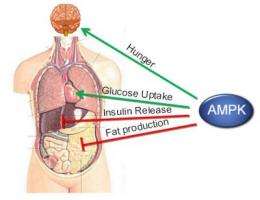New role for master regulator in cell metabolism, response to stress

AMP-activated protein kinase, or AMPK, is a master regulator protein of metabolism that is conserved from yeast to humans. When a cell is low on fuel, AMPK shuts down processes that use energy and turns on processes that produce energy.
Biologists have been studying how AMPK works for several decades and know that once it is activated, AMPK turns on a large number of genes by passing the "make more energy" message through numerous signaling cascades in the cell. What was not known, until now, was that AMPK also works via an epigenetic mechanism to slow down or stop cell growth.
Shelley Berger, PhD, Daniel S. Och University Professor and director of the Epigenetics Program at the University of Pennsylvania, and David Bungard, PhD, a postdoctoral fellow in the Berger lab at the University of Pennsylvania School of Medicine, in collaboration with Craig Thompson, MD, director of the Abramson Cancer Center at Penn, and Russell G. Jones, PhD, Goodman Cancer Centre at McGill University, found that AMPK binds directly to sites on chromosomes called promoters that regulate gene expression related to cell metabolism. They published their findings this week online in Science Express.
Unlike genetic changes, which involve a change or mutation in DNA sequence, epigenetic changes in the nucleus leave the DNA sequence unaltered but modify the histone proteins, which comprise the backbone of the chromosome. Histones are proteins found in the nucleus that package and order DNA into structural units. Epigentic changes alter how DNA folds in chromosomes, changing how accessible genes are to regulatory proteins and enzymes that copy genes into RNA messages.
"Epigenetics is the study of how factors outside of actual DNA interact with, but not alter, genes. It is turning out, through recent discoveries, that epigenetic information plays an important role in human health and disease," says Berger.
"Our results show a direct link between the energy state of the cell and its epigenetic status," adds Bungard.
Thus far, the investigators have identified two genes that are regulated by AMPK at the histone level in the nucleus. These initial observations were made in tissue-culture cells and the team is now working to confirm them in animal models.

AMPK's main role is to sense cell stress. In this study, cells were stressed with ultraviolet radiation and low levels of glucose, a common source of cell energy. In the sequence of events after stress, AMPK picks up the cell-stress signal and travels to the nucleus to bind to the important tumor suppressor p53 protein. This in turn, causes a phosphate to be added to a histone near the p21 gene, which turns the gene on. The function of p21 is to stop or slow down the cell cycle until energy levels are restored to normal.
The same mechanism occurs at other genes regulated by AMPK, allowing direct control of the many processes that AMPK regulates. These processes, such as sugar storage, insulin production, and other pathways, are altered in obesity and diabetes.
The researchers were surprised by these findings on many fronts: This is the first time that investigators have shown that AMPK is present on chromatin, that it targets histones, and that p53 is involved in sensing stress via AMPK. Other stress-response proteins could use similar epigenetic pathways, and thus may be a common way that cells respond to stress.
The work conducted by the team holds out promise for new therapies for a number of diseases, including diabetes and cancer. For example, AMPK is a target of metformin, the most commonly prescribed drug for the treatment of Type II diabetes. Understanding how AMPK can directly change gene expression may lead to the identification of new disease-associated targets and potential therapies.















